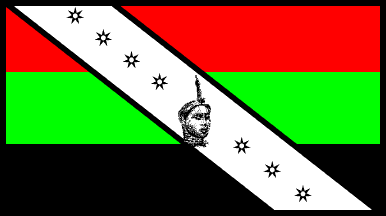
Text of the communique from the Yoruba Assembly held at the Oyo State House of Assembly, Ibadan, Oyo State — 30 August 2012
Representatives of various political parties, sub-ethnic groups of the Yoruba of Nigeria, professional and vocational groups, at a PAN-YORUBA CONFERENCE to which the following categories of eminent Yoruba personalities were invited:All former Heads of state of Yoruba stock, All former Vice Presidents of the military era, Chiefs of General Staff or Chiefs of Staff (Supreme Headquarters), All former and current state governors of South West states and Kwara, and Itsekiri who are Yoruba, All Yoruba former Presidents of the Senate and Speakers of the House of Representatives, all former Chief Justices of Nigeria, (CJN) former Justices of the Supreme Court and other retired judges, all Yoruba former and serving members of the House of Representatives, all former and serving Speakers of the various Yoruba states Houses of Assembly. They also include leaders of all political parties from Yoruba land, Top Yoruba professionals, Chairmen and secretaries of all Self-determination Groupsat the state levels in Yoruba land; Yoruba Trade Groups Chairmen and Secretaries at state levels, Chairmen and Secretaries of Diaspora Groups, Women and Youth Leaders of Yoruba land at state levels, Yoruba Academics, Religious Leaders and other Yoruba leaders from across the States of Ekiti, Lagos, Ondo, Ogun, Osun, Kwara, Kogi and out Itsekiri kith and kin of Delta state,met in Ibadan on the 30 August 2012 and discussed the general state of affairs of the so-called Nigerian federation.
At the end of robust deliberations on pertinent issues, the following decisions were adopted as resolutions:
1. Noted that Nigeria is, once again, at a critical crossroad. After more than 50 years of Independence and less than 2 years shot of 100 years after the 1914 amalgamation, deep structural issues and Nationality Questions, such as Federalism, Fair and Equitable Revenue Allocation, Security, Free and Fair Elections, State Police and inter-relationship amongst the different Nationalities remain unresolved! Indeed, the need for a National Dialogue to resolve the issues has never been more pressing. The general state of the Nigerian federation is disturbingly unhealthy. There is general insecurity in the land, there is growing decay of infrastructure, and there is increasing tension in the polity, exacerbated by mounting unemployment all over the country.
2. Observed further that the failure of the Nigerian Federation to meet the challenge of building a modern multi-ethnic democratic state can be traced to several factors that include: absence of a negotiated constitution by citizens, existence of a constitution that erodes the pre-military federal character of the Nigerian State, political and bureaucratic corruption that seems to arise from a sense of alienation from the state on the part of those expected to provide a sense of belonging and direction for the citizenry, and the menace of religious and cultural intolerance.
3. Noted in particular, the 1999 Constitution, on the basis of which the country is governed today, is seen as a source of tension between federating units. The constitution imposes a unitary model of government on a country with diverse cultural and religious orientations and values, thereby putting most of the powers and resources to develop the federation in the hands of the government at the center, the farthest government from the citizenry.
4. Noted that the growth of the Yoruba region, referred to as the Southwest in the 1999 Constitution, has been stalled by the imposition of a unitary form of government that denies states the right and benefit of fiscal federalism, a corner stone of federalism worldwide. In this respect, all aspects of modern life in the Southwest: education, health, transportation, and social welfare of citizens have declined so sharply that the quality of life of the average citizen in the region today is lower than what it was in 1970.
5. Expressed alarm towards the commencement of the cashless policy in Lagos state while living out equally vibrant commercial centers such as Kano, Onitsha and Port Harcourt. The Assembly recognizes that making Lagos a guinea pig of this policy amounts to a deliberate attempt to ruin the base of Yoruba economy
6. Viewed the menace of Boko Haram as a sign of religious and cultural intolerance that is capable of destroying the unity of the country and of endangering the life of citizens not only in the North but all over the country. We believe that central ideology of Boko Haram regarding modern or western education is not a matter to be settled by security forces, but one that needs to be discussed at a national conference that is designed to restructure the federation.
7. Observed that sustainable unity and development of the country cannot flow from over concentration of power and resources in the central government. For example, we note that lack of effective law enforcement and assurance of security and safety for citizens is traceable to the over concentration of powers in the central government: police, intelligence gathering, and crime prevention. This arrangement leaves states without the power to enforce laws made by their elected officials for ensuring public order.
8. Noted that on the basis of the evidence that the failure of governance in the country has grown with the transfer of powers from federating units to the central government, we affirm the urgency to restructure the polity at a national conference of federating units, at which representatives of federating units chosen by citizens strictly for such purpose will produce a new constitution to be ratified through a national referendum.
9. Agreed that the process of restructuring should start with federating units, which must in their own space first discuss and determine the type of relationship they want between their region and the central government and relationship between states and the region in which they are located. For we, the Yoruba, the country Nigeria, is a forced marriage of diverse ethno-national groups, struggling to find form and shape, and limiting promises and possibilities.
10. Re-affirmed the commitment of the Southwest to the territorial unity of the country and resolved to work for enhancement of the country’s unity by cooperating with other regions to resolve peacefully the conflict and tension thrown up by the current unitary constitution that limits the control of federating units over their affairs and development.
11. Recognized that the best way to sustain unity in a culturally diverse polity and society is to organize the politics and economy of such country on the basis of a federal system of governance. Most culturally diverse countries of the world that are able to sustain peace and development have been able to do so through a federal constitution. Nigeria’s cultural diversity is too pronounced for the political elite to pretend that a unitary constitution can be substituted for a federal constitution that is generally designed to respond to diversity and optimize the benefits of diversity for peace and development.
12. Resolved to set up the Southwest Constitutional Commission (SCC) for the purpose of coordinating memoranda from citizens and groups in the Southwest towards a federal constitution for the country and of producing a constitutional framework for the region as unit of the Nigerian federation.
13. A new Nigeria consisting of a federal government and six regional governments (based on the current six geo-political zones) operating federal and regional constitutions, respectively.
• A single legislative list which will be the Exclusive Legislative List consisting only those functions ceded to the Central Government.
• The adoption of the Westminster model of parliamentary government.
• A Regional and State Police force structure.
• The establishment of a Constitutional Court with jurisdiction over inter-governmental cases and petitions from elections to the national Assembly
• The Conference fully supports the on-going Regional integration in the South West.
• That all public officers who currently enjoy immunity be made amenable to court processes on charges bordering on commission of crimes.
• That an informal role for traditional rulers in the political structure be recognised.
The conference further decided as follows:
• The adoption of Open-Secret ballot system for voting at elections.
• Total condemnation of Boko Haram’s indiscriminate violence in killing people, including Yoruba in the North.
• The setting up by the South West States of vigilante groups to protect them against the re-insurgence of crimes and violence perpetrated by nomadic tendencies or motivated by faith or otherwise. In this respect, each State House of Assembly in the region should pass appropriate laws.
• That the Yoruba as an ethnic group should design and produce a common flag and anthem. This is without prejudice to the anthems and flags of each state.
14. Finally and in conclusion, the Conference thanks the Governor and people of Oyo State for hosting this most important and crucial meeting of a comprehensive cross-section of the Yoruba people.
